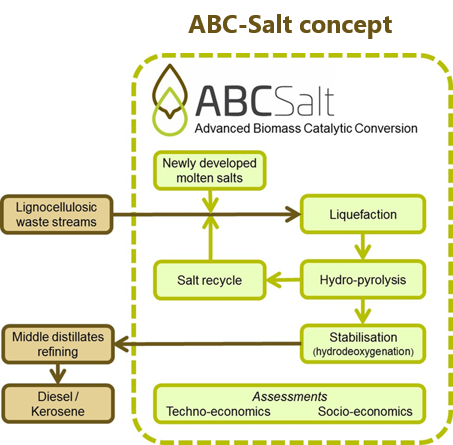Secure, clean and efficient Energy - ABC-Salt
Introduction
The Advanced Biomass Catalytic Conversion to Middle Distillates in Molten Salts (ABC-Salt) is a four-year project founded by the EU Horizon 2020 framework (764089) to demonstrate a novel route to produce sustainable liquid biofuels at laboratory scale from various lignocellulosic waste streams. The ABC-Salt consortium consists of nine European partners (RUG - University of Groningen, AU - Aston University, NMBU - Norwegian University of Life Sciences, Sapienza University of Roma, DLR - German Aerospace Center, BTG - Biomass Technology Group, RISE, Ghent University, Ayming)
Project description
ABC-SALT aims to develop a cost effective integrated process for the conversion of waste lignocellulosic biomass including lignin rich feeds to middle distillate hydrocarbons. Middle distillates are important fuels in the transportation sector, both for road (diesel) and air transport (jet fuel). This project aims to bring the technology to convert biomass residues into middle distillate from today’s TRL 2 to TRL 4.
The technical core is composed of three elements:
• Liquefaction of various lignocellulosic biomasses in molten salts;
• Hydro-pyrolysis of the dissolved biomass;
• Catalytic hydro-deoxygenation of the vapors.
This route targets a yield of fuels over 35 % in weight from the dry feed, with more than 2/3 in the middle distillate (MD) range (all based on the biomass dry input). The project covers the full value chain, from feedstock supplier (RISE) to end-users in the transportation sector (through DLR) via conversion technology (BTG) and is supported by knowledge providers (Universities and RTO: RUG, AU, NMBU, UGent, CIRPA).
Major technological as well as environmental and social barriers will be addressed and investigated. The project thus includes technical aspects (such as various waste biomass selection, biomass liquefaction and hydro-pyrolysis in molten salts and subsequent hydro-deoxygenation and their integration) and an assessment of the techno-economic viability of the technology (substrates availability and supply chain, future end-users and economic sustainability of the process). Studies in the social domain will include an investigation of the possible barriers for social acceptance of transport induced by sustainable biofuels in generals and the MD’s derived from the ABC-SALT process in particular.
Objectives
The objectives of ABC-Salt are:
- Enable the development of an economically viable, environmentally friendly and socially acceptable process for the conversion of lignocellulosic waste streams to middle distillates.
- Select the most appropriate lignocellulosic waste streams and assess the ability of molten salts to liquefy such streams below 200 °C and atmospheric pressure with 90 wt. % yield based on biomass input (90 wt. % based on carbon input).
- Conversion of the liquefied biomass to MD’s using hydro-pyrolysis followed by hydro-deoxygenation with a yield of 38 wt. % based on biomass input (55% based on carbon input).
- Demonstrate the conversion of the lignocellulosic waste streams into a MD biofuel in an integrated process with over 35 % yield based on dry biomass input (55 wt. % based on carbon input) for at least 100 hours at a minimum scale of 100 g/h input.
Role of Ghent University
The main role of Ghent University in ABC-Salt project is dedicated to Work Package 4 (Hydro-pyrolysis in molten salts). Here, the fundamentals of hydro-pyrolysis of biomass in molten salts will be investigated, deriving reaction mechanisms to reveal the best conditions for carrying out molten salt hydro-pyrolysis, with the liquid product yield and quality as key performance indicators.
Website
Contact
Prof. Frederik Ronsse
Department Green Chemistry and Technology – Thermochemical Conversion of Biomass Research Group
Phone number: +32 9 264 62 00
E-mail
